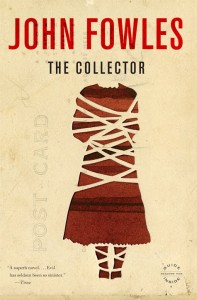Fowles, John. (1963). The Collector. New York: Back Bay/Little Brown.
This novel is often compared to Lolita because it involves an older man’s sexual obsession with a young girl, but the comparison is not apt. First, “Fred,” the kidnapper, is only slightly older than the girl, and the girl is an almost-adult 20 years old. Second, While Fowles is a good writer of psychological states, he is no Nabokov when it comes to flourishes with the language, and that’s the reason one reads Lolita, not because of the pedophilia. Third, it is not clear if Fowles’ kidnapper is sexually motivated. He has some mild fantasies, but never acts on them so we don’t really know what motivates him. So Lolita, it isn’t, though I think it is an homage to that novel.
Fred is a creepy working class guy obsessed with a college girl in his town, Miranda. When he wins the lottery, he buys a country cottage and outfits it as a prison, then kidnaps Miranda. She tries to convince him her family cannot afford a ransom, not realizing it is not really a kidnap and she will never leave that cottage.
But if it’s not a traditional kidnap, what is it? Fred is a butterfly collector (as was Nabokov), proud of his collection, but he can’t explain why. He has “collected” Miranda for reasons unclear even to himself, and certainly unclear to the reader. From their interactions we learn that he is a simple, awkward, inexperienced, and uneducated man with petite bourgeoise values of propriety. She is well-educated but more snarky than classy. There is class warfare in their conversations, but nothing new or interesting is said, except this: both of them say, independently, in different ways, that only because Fred got all that money did he pursued his obsession. Everybody has fantasies, but most people are held to decency by their poverty, or at least by the need to make a living. If you give any poor and ignorant person a ton of money, they will turn antisocial on you. Is it true? I can think of examples where it seems to be.
We can almost (but not quite) understand why Fred collected Miranda. He cares for her in a fatherly way, and wants respect, adoration, and to be powerful and important to her. Her diary reveals she likes fatherly traits in a man, and has “no problem” with romances between younger women and older men. So there’s a mild Freudian theme going on there. However Fred is untutored, with no sensibility for the arts so she rejects him forthright (and of course, because he is her captor).
In the end, Fred reveals himself to be a psychopath and becomes uninteresting, just another random nut-job. Psychopathy is largely a genetic and brain disorder, having next to nothing to do with education or class, but Fowles would not have seen it that way in 1963. Still, if it was his intent to paint a sympathetic portrait of a psychopath, it was only slightly convincing. I mean, as soon as a guy locks a girl in his basement, is there any more to say? Fowles tried to humanize Fred but our modern knowledge of mental disorders and crazy, misogynistic kidnappers may not allow it.


I think you’re being a little haughty about our ‘modern knowledge’. Novelists don’t need clinical labels to identify a condition. Fowles indicates subtly but quite regularly the alarming lack of empathy in Fred. It’s a complete evicoration of his kind (the philistine petit borgeouise). I don’t agree with your detection of sympathy; it’s an accurate, unhysterical portait of a soulless loner. His detached and self congratulatory moments of compassion make him even more loathsome and despicable – not only is he a callous weirdo, but a cretin to boot.